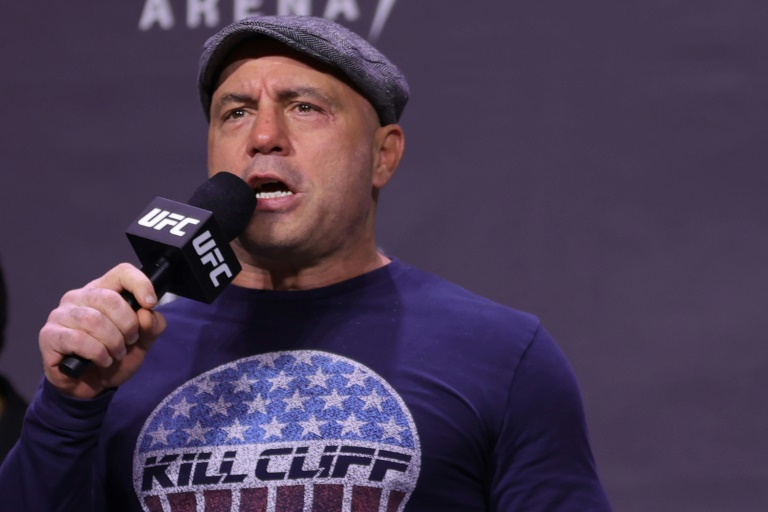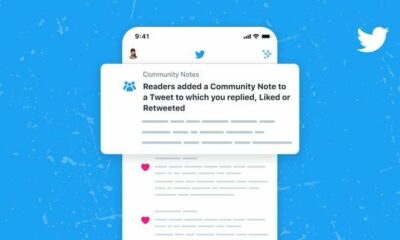SOCIAL
US star Joe Rogan, podcaster in eye of misinformation storm

Joe Rogan says he does not intend to promote misinformation but admits he was not prepared for the “strange” responsibility of millions of listeners – Copyright AFP François WALSCHAERTS
Charlotte PLANTIVE
US podcast star Joe Rogan, who has been called out by music legends Neil Young and Joni Mitchell for spreading Covid-19 disinformation on the hugely popular Spotify streaming service, is as enthralling as he is provocative.
At 54, the former taekwondo champion has millions of fans, who appreciate his outspokenness, his iconoclastic ideas, and the variety of his guests.
But he also has many detractors, starting with luminaries Young and Mitchell, who removed their music from Spotify in protest at its hosting of Rogan’s podcast.
He has spread disinformation about the coronavirus and other topics on the air. Both musicians said the false claims, and Spotify’s failure to do anything about them, was the reason for their decision.
R&B singer India Arie followed suit, citing what she said were Rogan’s “problematic” comments on race.
For his accusers, he is particularly dangerous because his show “The Joe Rogan Experience,” which has been broadcast exclusively on Spotify since 2020 under a deal worth an estimated $100 million, attracts a staggering 11 million listeners per episode on average.
Often with a glass of whiskey in hand, he chats casually for two to three hours with a guest on topics as varied as flying saucers, psychedelic drugs, red meat and fitness, slipping in an expletive here and there.
– ‘Megaphone of right-wing lies’ –
Rogan, with a tongue as sharp as his arms are tattooed, was already famous when he began the program in 2009.
A comedian and martial arts commentator known for tight T-shirts and what critics have branded his “toxic masculinity,” in the 1990s he was a TV actor on sitcoms including NBC’s “NewsRadio.”
Later he hosted the popular reality show “Fear Factor.”
When he launched the podcast, his ratings quickly took off.
People from all walks of life asked to come on. In 12 years, he has hosted nearly 1,000 guests — 88 percent of them male, according to the fan site JRELibrary.
They include Tesla boss Elon Musk, who smoked a joint on his set, whistleblower Edward Snowden and film director Oliver Stone.
But Rogan has also given voice to climate sceptics, conspiracy theorist Alex Jones and, since the start of the pandemic, figures in the anti-vaccine movement, earning him the label of “a veritable megaphone of right-wing lies” by progressive website Media Matters for America.
Posing as a critic of political correctness, he has attacked the left for demonising conservatives and flirted with unfounded theories held dear by former president Donald Trump’s supporters — notably about the presence of undercover FBI agents among the US Capitol attackers on January 6 2021.
Like the former Republican president, he hates “losers.”
“I grew up around a lot of losers and one of them was my dad,” a former police officer who was violent and who left his family, Rogan said in an interview in 2016.
“There was a lot of desire to not be like that guy and not be like all of these people around me who had no hope and no future.”
– ‘Differing opinions’ vs misinformation –
Yet he defends himself against accusations of being an ideologue or of voting exclusively on the right.
An atheist who supports gay marriage, the decriminalization of soft drugs, and the preservation of gun rights, he calls himself a libertarian and said he even considered supporting self-described socialist Senator Bernie Sanders in the last Democratic primary.
As for his guests, “I’m interested in having interesting conversations with people that have differing opinions. I’m not interested in only talking to people that have one perspective,” he said in a video posted on Instagram after Young’s criticism that seemingly conflated misinformation with opinions.
“I’m not trying to promote misinformation,” he continued. “I will do my best to try to balance out these more controversial viewpoints with other people’s perspectives.”
He said he agreed with Spotify’s announcement in response to Young and Mitchell that Covid podcasts would include links to factual and scientifically sourced information.
In a perhaps telling comment for someone who was already famous before launching his podcast, he admitted he had not been ready for the “strange” responsibility of having “this many viewers and listeners.”
“It’s nothing that I prepared for, and it’s nothing that I ever anticipated.”
Source link
SOCIAL
Snapchat Explores New Messaging Retention Feature: A Game-Changer or Risky Move?

In a recent announcement, Snapchat revealed a groundbreaking update that challenges its traditional design ethos. The platform is experimenting with an option that allows users to defy the 24-hour auto-delete rule, a feature synonymous with Snapchat’s ephemeral messaging model.
The proposed change aims to introduce a “Never delete” option in messaging retention settings, aligning Snapchat more closely with conventional messaging apps. While this move may blur Snapchat’s distinctive selling point, Snap appears convinced of its necessity.
According to Snap, the decision stems from user feedback and a commitment to innovation based on user needs. The company aims to provide greater flexibility and control over conversations, catering to the preferences of its community.
Currently undergoing trials in select markets, the new feature empowers users to adjust retention settings on a conversation-by-conversation basis. Flexibility remains paramount, with participants able to modify settings within chats and receive in-chat notifications to ensure transparency.
Snapchat underscores that the default auto-delete feature will persist, reinforcing its design philosophy centered on ephemerality. However, with the app gaining traction as a primary messaging platform, the option offers users a means to preserve longer chat histories.
The update marks a pivotal moment for Snapchat, renowned for its disappearing message premise, especially popular among younger demographics. Retaining this focus has been pivotal to Snapchat’s identity, but the shift suggests a broader strategy aimed at diversifying its user base.
This strategy may appeal particularly to older demographics, potentially extending Snapchat’s relevance as users age. By emulating features of conventional messaging platforms, Snapchat seeks to enhance its appeal and broaden its reach.
Yet, the introduction of message retention poses questions about Snapchat’s uniqueness. While addressing user demands, the risk of diluting Snapchat’s distinctiveness looms large.
As Snapchat ventures into uncharted territory, the outcome of this experiment remains uncertain. Will message retention propel Snapchat to new heights, or will it compromise the platform’s uniqueness?
Only time will tell.
SOCIAL
Catering to specific audience boosts your business, says accountant turned coach

While it is tempting to try to appeal to a broad audience, the founder of alcohol-free coaching service Just the Tonic, Sandra Parker, believes the best thing you can do for your business is focus on your niche. Here’s how she did just that.
When running a business, reaching out to as many clients as possible can be tempting. But it also risks making your marketing “too generic,” warns Sandra Parker, the founder of Just The Tonic Coaching.
“From the very start of my business, I knew exactly who I could help and who I couldn’t,” Parker told My Biggest Lessons.
Parker struggled with alcohol dependence as a young professional. Today, her business targets high-achieving individuals who face challenges similar to those she had early in her career.
“I understand their frustrations, I understand their fears, and I understand their coping mechanisms and the stories they’re telling themselves,” Parker said. “Because of that, I’m able to market very effectively, to speak in a language that they understand, and am able to reach them.”Â
“I believe that it’s really important that you know exactly who your customer or your client is, and you target them, and you resist the temptation to make your marketing too generic to try and reach everyone,” she explained.
“If you speak specifically to your target clients, you will reach them, and I believe that’s the way that you’re going to be more successful.
Watch the video for more of Sandra Parker’s biggest lessons.
SOCIAL
Instagram Tests Live-Stream Games to Enhance Engagement

Instagram’s testing out some new options to help spice up your live-streams in the app, with some live broadcasters now able to select a game that they can play with viewers in-stream.
As you can see in these example screens, posted by Ahmed Ghanem, some creators now have the option to play either “This or That”, a question and answer prompt that you can share with your viewers, or “Trivia”, to generate more engagement within your IG live-streams.
That could be a simple way to spark more conversation and interaction, which could then lead into further engagement opportunities from your live audience.
Meta’s been exploring more ways to make live-streaming a bigger consideration for IG creators, with a view to live-streams potentially catching on with more users.
That includes the gradual expansion of its “Stars” live-stream donation program, giving more creators in more regions a means to accept donations from live-stream viewers, while back in December, Instagram also added some new options to make it easier to go live using third-party tools via desktop PCs.
Live streaming has been a major shift in China, where shopping live-streams, in particular, have led to massive opportunities for streaming platforms. They haven’t caught on in the same way in Western regions, but as TikTok and YouTube look to push live-stream adoption, there is still a chance that they will become a much bigger element in future.
Which is why IG is also trying to stay in touch, and add more ways for its creators to engage via streams. Live-stream games is another element within this, which could make this a better community-building, and potentially sales-driving option.
We’ve asked Instagram for more information on this test, and we’ll update this post if/when we hear back.
-

 WORDPRESS7 days ago
WORDPRESS7 days ago10 WordPress Influencers to Follow in 2024 – WordPress.com News
-

 PPC6 days ago
PPC6 days agoCompetitor Monitoring: 7 ways to keep watch on the competition
-

 WORDPRESS6 days ago
WORDPRESS6 days agoThrive Architect vs Divi vs Elementor
-

 SEARCHENGINES6 days ago
SEARCHENGINES6 days agoMore Google March 2024 Core Update Ranking Volatility
-

 PPC5 days ago
PPC5 days agoA History of Google AdWords and Google Ads: Revolutionizing Digital Advertising & Marketing Since 2000
-

 PPC6 days ago
PPC6 days ago31 Ready-to-Go Mother’s Day Messages for Social Media, Email, & More
-

 WORDPRESS5 days ago
WORDPRESS5 days agoTurkish startup ikas attracts $20M for its e-commerce platform designed for small businesses
-

 MARKETING4 days ago
MARKETING4 days agoRoundel Media Studio: What to Expect From Target’s New Self-Service Platform













You must be logged in to post a comment Login